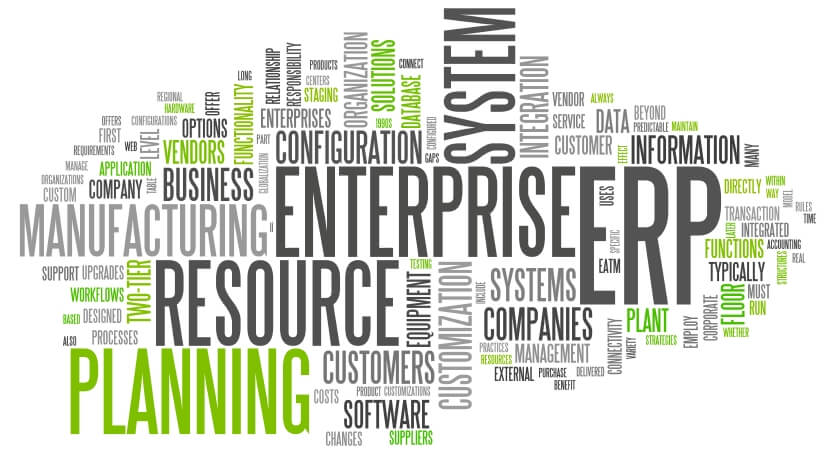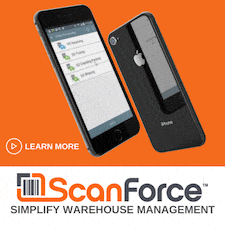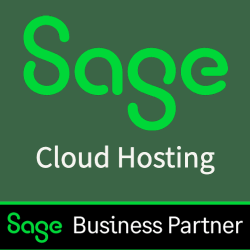There are many ways to answer that question. To some people, ERP is synonymous with accounting software and to others it's just another acronym in an industry (technology) that's filled with jargon. So, first things first: let's define what ERP stands for ...
ERP = Enterprise Resource Planning
Now that you know what ERP stands for, let's discuss what it means - for you and for your business.
ERP: More Than Accounting Software
While most people think that ERP is just a fancy way to refer to accounting software, its far more than just debits, credits, and journal entries.
To put it simply, ERP is a system that integrates (or connects) all of your business functions or transactions into one single software application. One system that runs everything from the shop floor, warehouse, or in the field to the accounting department, customer service, or executive office.
ERP systems (which include the "core" functionality of accounting software and a general ledger) typically integrate functions such as Inventory and Supply Chain Management, Order Processing and Purchasing, Customer Relationship Management, Manufacturing, Financial Reporting and Accounting, and more.
To put it simply, ERP is a system that integrates (or connects) all of your business functions or transactions into one single software application. One system that runs everything from the shop floor, warehouse, or in the field to the accounting department, customer service, or executive office.
ERP systems (which include the "core" functionality of accounting software and a general ledger) typically integrate functions such as Inventory and Supply Chain Management, Order Processing and Purchasing, Customer Relationship Management, Manufacturing, Financial Reporting and Accounting, and more.
One Single Database for Better Efficiency and Reporting
Perhaps most importantly, all of those functions are connected and "talking to each other," sharing the same data, optimizing workflow, cutting costs, and creating efficiency that you wouldn't get if you were running 3 or 4 different software applications to run each of those functions individually (in a "silo").
Plus with all of the data and information from across your business (or "enterprise") in one database, reporting is faster, easier, more accurate, and helps everyone make better and more informed decisions.
ERP software helps you run like a lean, mean, profit-making machine!
- Accounting and Finance
- Order Processing and Purchasing
- Inventory Control and Warehouse Management
- Manufacturing and Supply Chain Management
- Reporting, Business Intelligence, and Analytics
- Much more ...
Plus with all of the data and information from across your business (or "enterprise") in one database, reporting is faster, easier, more accurate, and helps everyone make better and more informed decisions.
ERP software helps you run like a lean, mean, profit-making machine!
What Are the Benefits of ERP?
With a fully-integrated ERP system, employees across departments - from finance, accounting and payroll to manufacturing and production, inventory management, supply chain and order processing - can use the same reliable information to meet their day-to-day needs.
Key benefits of implementing the right ERP software can include:
Key benefits of implementing the right ERP software can include:
- Streamline key processes - eliminating manual processes and converting spreadsheet or paper-based tracking methods will maximize efficiency to help your staff get more work done in less time.
- Reduce operational costs - ERP systems help identify process inefficiencies and areas for improvement to inform business decisions that reduce operating costs, while at the same time helping to grow your business.
- Bridge departmental gaps - ERP ensures everyone is on the same page, improving the flow of information between departments and managing all operations in one single location/database. No more messy networks of disconnected multiple apps running different areas of your business.
- Deeper reporting insight - eliminate information silos, gain a single source of truth, and get fast answers to mission-critical business questions.
How is ERP Implemented?
These days, an ERP implementation can be rolled out in several different ways. Here's a summary of the most common deployment methods:
Cloud ERP
With cloud ERP, your software typically runs on a 3rd party provider’s cloud hosting platform. Maintenance of the IT hardware, servers, and often the ERP system itself is handled by the provider.
On-Premises ERP
This is the "classic" model of ERP implementation where you manage and control everything at your location, on your own IT infrastructure. The installation, system maintenance, and software updates/upgrades are the responsibility of your own IT staff (or a support provider such as a Sage Authorized Partner).
Hybrid ERP
This implementation method combines aspects of both Cloud and On-Premises deployment to create a hybrid ERP approach. For example, some of your ERP applications and data (perhaps your core financials or most sensitive data) is hosted on-premises while other less mission-critical functions (perhaps sales/CRM) are hosted in the cloud. This is sometimes referred to as two-tier ERP.
Cloud ERP
With cloud ERP, your software typically runs on a 3rd party provider’s cloud hosting platform. Maintenance of the IT hardware, servers, and often the ERP system itself is handled by the provider.
On-Premises ERP
This is the "classic" model of ERP implementation where you manage and control everything at your location, on your own IT infrastructure. The installation, system maintenance, and software updates/upgrades are the responsibility of your own IT staff (or a support provider such as a Sage Authorized Partner).
Hybrid ERP
This implementation method combines aspects of both Cloud and On-Premises deployment to create a hybrid ERP approach. For example, some of your ERP applications and data (perhaps your core financials or most sensitive data) is hosted on-premises while other less mission-critical functions (perhaps sales/CRM) are hosted in the cloud. This is sometimes referred to as two-tier ERP.
ARE YOU READY FOR ERP SOFTWARE?
Sage offers a wide variety of ERP solutions that can be configured and customized to fit your unique business processes and goals. Sage ERP systems are designed with you in mind.
Are you ready to experience what ERP software can do for you?
Are you ready to experience what ERP software can do for you?



